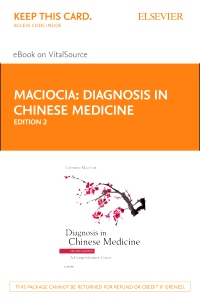
Diagnosis in Chinese Medicine - Elsevier eBook on VitalSource (Retail Access Card), 2nd Edition
Elsevier eBook on VitalSource - Access Card

Written by world-renowned author and teacher Giovanni Maciocia, Diagnosis in Chinese Medicine, 2nd Edition is a comprehensive, highly illustrated, and easy-to-understand teaching and learning resource. With a focus on clear interpretations of "real world" signs and symptoms, this new edition addresses the practice beyond the theory and leads readers through both basic and sophisticated levels of diagnostic interpretation. Since Chinese medicine diagnosis relies on a subtle appraisal of a patient's disharmony, many factors beyond traditional Western symptoms are considered, including a patient's voice, the absence of thirst, feeling hot or cold, the patient's smell, tone of voice, and glitter of eyes. This practical resource helps students and practitioners alike carefully interpret a wide-range of diagnostic nuances.
-
- NEW! Clinical and Treatments notes provide practical information on acupuncture – including herbal treatment, when appropriate – for most symptoms and signs, giving the book a clinical application in therapy.
- NEW! UPDATED full-color design and color photographs depict external clinical signs for more accurate clinical recognition.
- NEW! Learning outcomes summarize the basics that students should know after completing a chapter.
- NEW! Thoroughly updated content from an expert author clarifies the best practices for diagnosis in Traditional Chinese Medicine.
- One-of-a-kind text gives students and practitioners a clinical understanding of Traditional Chinese Medicine.
- Rich, unique content offers an unparalleled depth of information that is meticulously cross-referenced.
- Includes all the signs and symptoms that a modern patient may present in the clinic, no matter how subtle.
- Outlines the decision-making options in key situations to help students through the most challenging topics.
- Case histories with diagnoses present common conditions that professionals will often find in practice.
- Logically organized to help students quickly find the information they need in clinical situations.
- Written by a leader in the field of Chinese medicine provides readers with an expert’s clinical experience and understanding.
-
- NEW! Clinical and Treatments notes provide practical information on acupuncture – including herbal treatment, when appropriate – for most symptoms and signs, giving the book a clinical application in therapy.
- NEW! UPDATED full-color design and color photographs depict external clinical signs for more accurate clinical recognition.
- NEW! Learning outcomes summarize the basics that you should know after completing a chapter.
- NEW! Thoroughly updated content from an expert author clarifies the best practices for diagnosis in Traditional Chinese Medicine.
-
Part I: Diagnosis by Observation
Section 1: Observation of the Body, Mind and Complexion
1. Observation Of The Body Shape, Physique And Demeanor
2. Observation Of The Mind, Spirit And Emotion
3. Observation Of The Complexion Color
4. Observation Of Body MovementsSection 2: Parts of the Body
5. Observation Of Head, Face And Hair
6. Observation Of The Eyes
7. Observation Of The Nose
8. Observation Of Lips, Mouth, Palate, Teeth, Gums And Philtrum
9. Observation Of The Ears
10. Observation Of Throat And Neck
11. Observation Of The Back
12. Observation Of Women’s Breasts
13. Observation Of The Heartbeat
14. Observation Of The Hands
15. Observation Of The Nails
16. Observation Of The Chest And Abdomen
17. Observation Of Genitalia
18. Observation Of The Four Limbs
19. Observation Of The Legs
20. Observation Of Excretions
21. Observation Of The Skin
22. Observation In ChildrenSection 3: Tongue Diagnosis
23. Tongue Diagnosis
24. Tongue-Body Color
25. Tongue Body Shape
26. Tongue Coating
27. Tongue Images And PatternsPart II: Diagnosis by Interrogation
28. Introduction
29. Pain
30. Food And Taste
31. Stools And Urine
32. Thirst And Drink
33. Energy Levels
34. Head
35. Face
36. Throat And Neck
37. Body
38. Chest And Abdomen
39. Limbs
40. Sleep
41. Sweating
42. Ears And Eyes
43. Feeling Of Cold, Feeling Of Heat And Fever
44. Mental-Emotional Symptoms
45. Sexual Symptoms
46. Women’s Symptoms
47. Children’s Symptoms
48. Diagnosing The Causes Of DiseasePart III: Diagnosis by Palpation
49. Diagnosis by Palpation
50. Pulse Qualities
51. Palpation Of Parts Of The Body
52. Palpation Of ChannelsPart IV: Diagnosis by Hearing and Smelling
53. Diagnosis By Hearing
54. Diagnosis By SmellingPart V: Symptoms and Signs
Section 1: Symptoms and Signs of Parts of the Body
55. Head And Face
56. Face Color
57. Ears
58. Nose
59. Throat
60. Mouth, Tongue, Teeth, Gums, Lips, Palate And Philtrum
61. Eyes
62. Neck, Shoulders And Upper Back
63. Chest
64. Limbs
65. Arms
66. Legs
67. Lower Back
68. Body
69. Digestive System And Taste
70. Thirst And Drink
71. Abdomen
72. Defecation
73. Urination
74. Anus
75. Men’s Sexual And Genital Symptoms
76. Sweating
77. Skin Signs
78. Emotional Symptoms
79. Mental And Emotional Symptoms
80. Mental Difficulties
81. Sleep
82. Feeling Of Cold, Feeling Of Heat, Fever
83. Voice, Speech And SoundsSection 2: Gynecological Symptoms and Signs
84. Menstrual Symptoms
85. Problems At Period Time
86. Problems Of Pregnancy
87. Problems After Childbirth
88. Breast Signs
89. Miscellaneous Gynecological SymptomsSection 3: Pediatric Symptoms and Signs
90. Children’s ProblemsPart VI: Identification of Internal Organ Patterns
91. Heart
92. Spleen
93. Liver
94. Lungs
95. Kidneys
96. Small Intestine
97. Stomach
98. Gall-Bladder
99. Large Intestine
100. BladderAppendices
Appendix 1: Case Histories
Appendix 2: Prescriptions
Appendix 3: History of Diagnosis in Chinese MedicineGlossary
Bibliography
Chinese Chronology

 as described in our
as described in our 